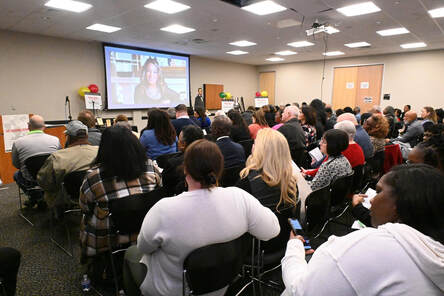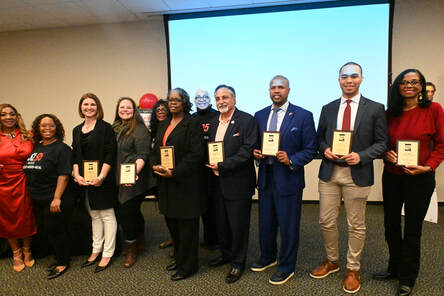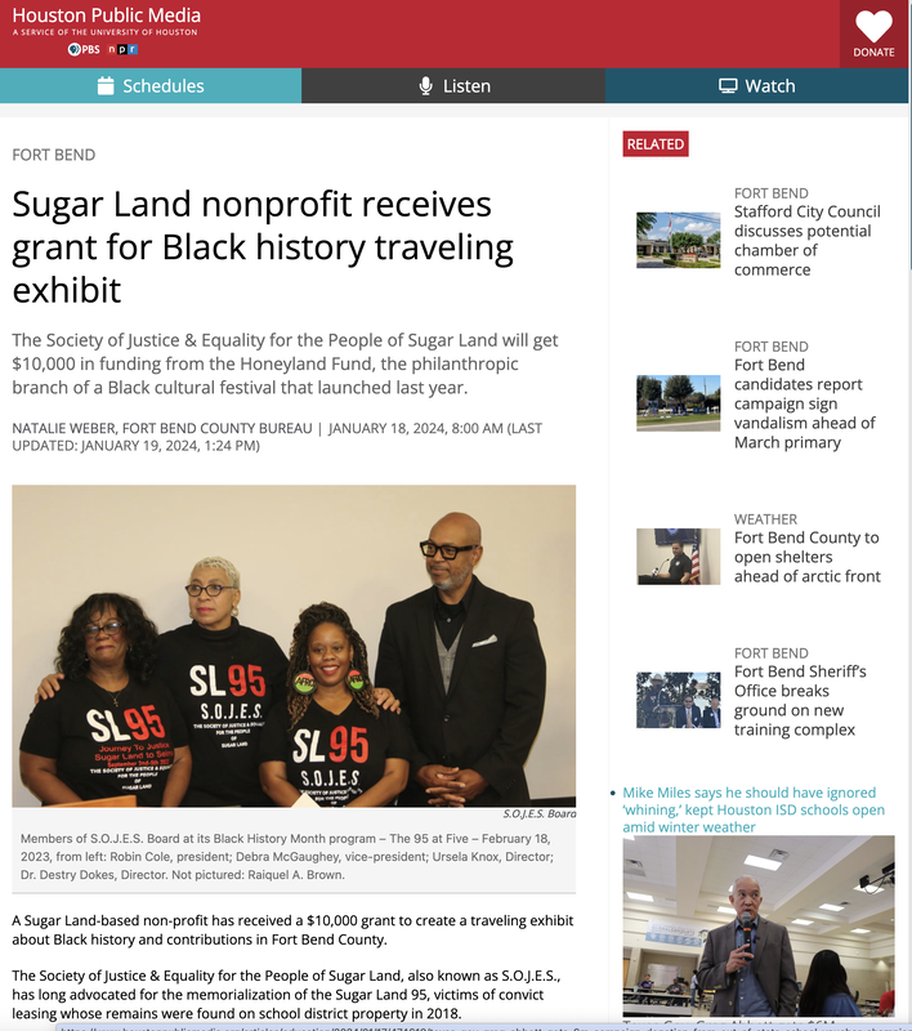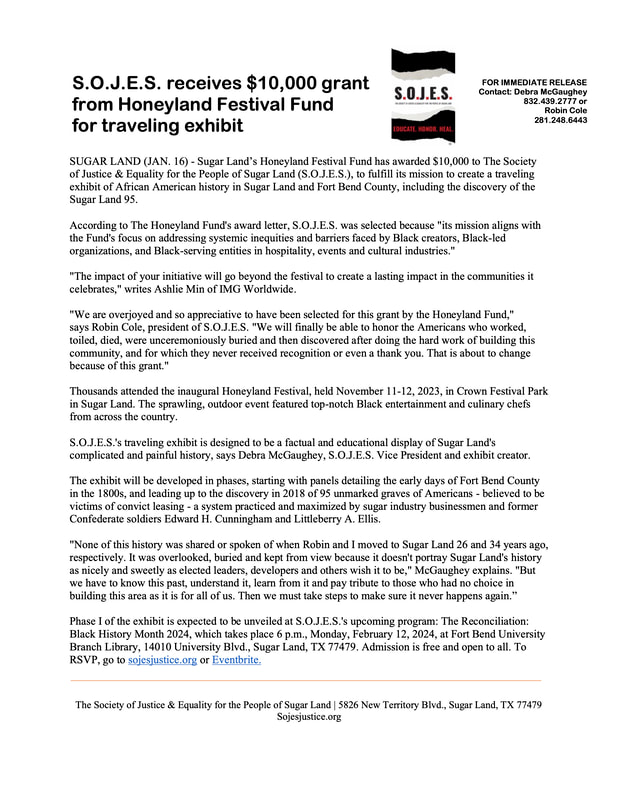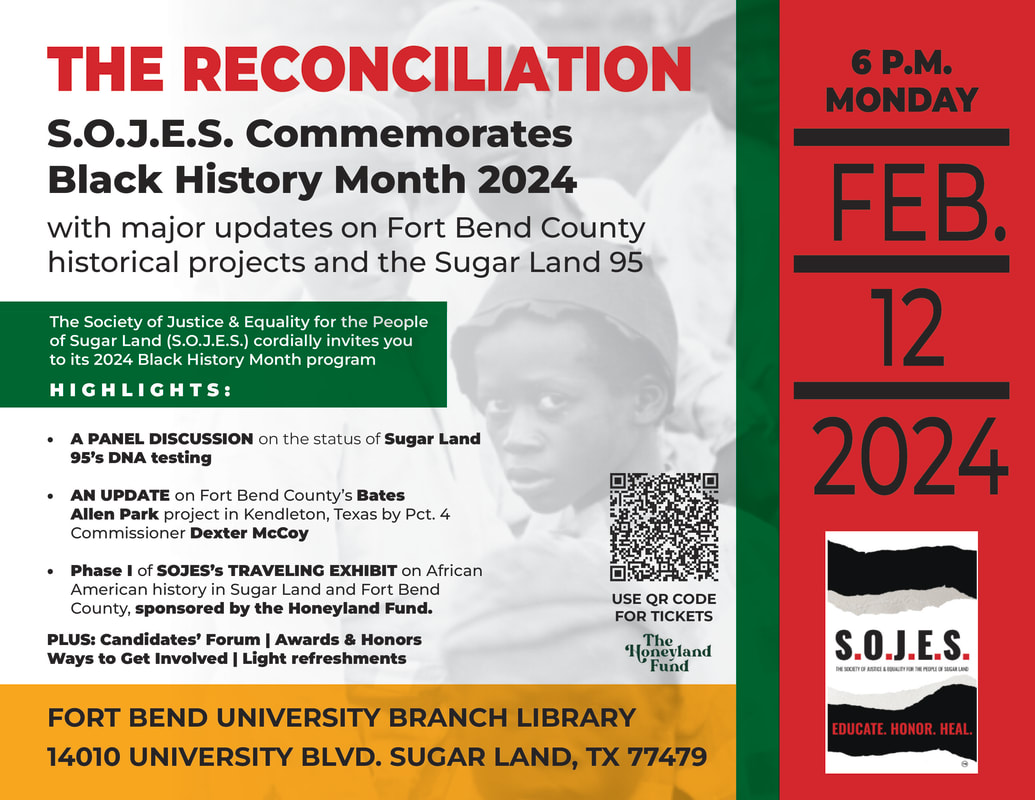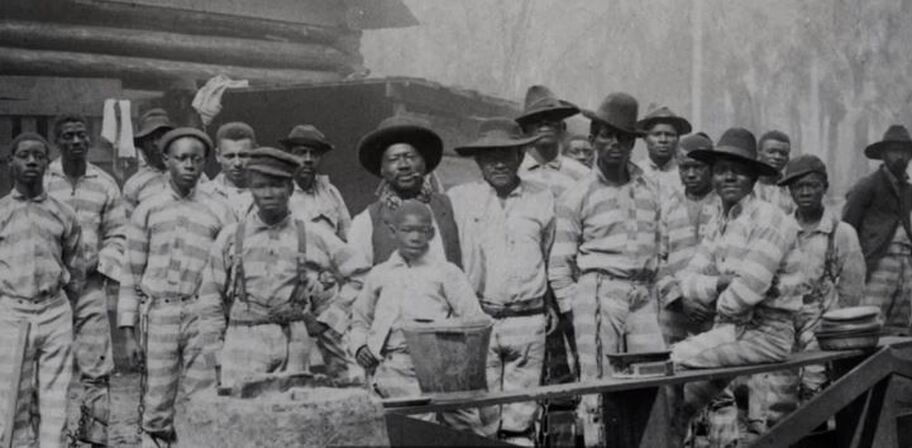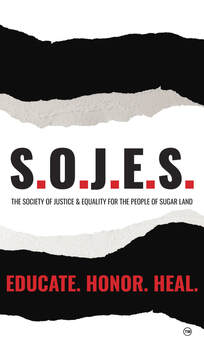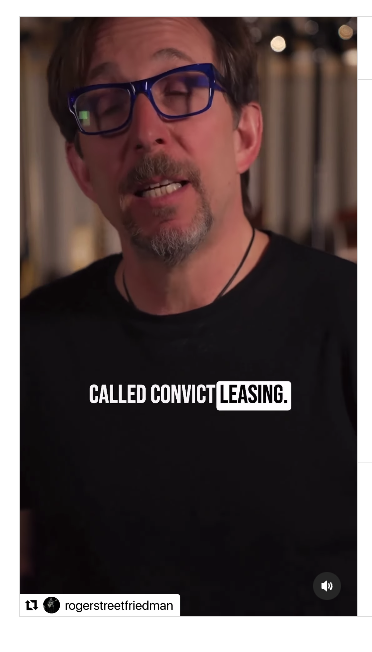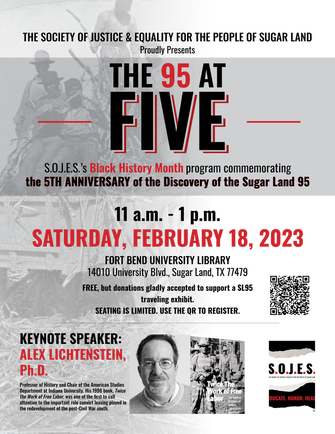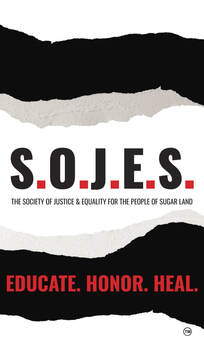The Society of Justice & Equality for the People of Sugar Land
Thank you, S.O.J.E.S. supporters.
The Black History Month event was great!
The Reconciliation: S.O.J.E.S.’s Black History Program
Standing Room Only!
The Reconciliation was held on February 12.
That date is historically important for many reasons.
It was Abraham Lincoln’s birthday, which was used as the date of the founding of the N.A.A.C.P (founded on February 12, 1909).
February 12, 1900 also is the date that the Negro National Anthem - Lift Every Voice and Sing - was first publicly performed.
And on this date in 2024, S.O.J.E.S. honored seven community service leaders with its first Sugar Land 95 Civil Rights Community Service Awards!
The 2024 awardees:
State Representative Ron Reynolds
State Representative Suleman Lalani
Congresswoman Lizzie Fletcher
Dr. Dana S. Smith
Dr. Catrina Whitley
Abigail Eve Fisher
Dr. Helen Graham
Rhonda Lewis-Jenkins did an amazing job as Mistress of Ceremonies to the more than 120 people in attendance. Her daughter - Raquel Nwosu - opened the program with an essay titled “History Is In Our Backyard,” which was a message regarding the finding of 95 human remains in our Sugar Land backyard during the construction of a FBISD technical high school in 2018.
Raquel is a sophomore at Fort Bend Stephen F. Austin High School.
S.O.J.E.S. President Robin Cole gave greetings to the attendees and challenged everyone with a few civil rights trivia questions regarding the progression of the civil rights movement. She also talked about six of the Sugar Land 95 who died in 1896 due to horrific conditions.
Symari McGinnis, a junior at William B. Travis High School, read a monologue titled “I Am Ida B. Wells.” This iconic civil rights leader wrote a paper in 1893 regarding convict leasing and lynching. The audience was surprised to learn that convict leasing was talked about more than 121 years ago, and how the loophole in the 13th Amendment - which fostered convict leasing - still exists is in the Constitution!
Ursela Knox, one of S.O.J.E.S.'s most-dedicated volunteers, gave an overview of the powerful S.O.J.E.S. podcast titled “Black Sugar, Not So Sweet."
An event highlight was a presentation from Fort Bend County Pct. 4 Commissioner Dexter McCoy, who gave a very inspirational update on the rendition of the African American Memorial Park that will be located in Kendleton, Texas.
Following Commissioner McCoy, Cole, McGaughey and Knox presented the seven honorees with the 2024 Sugar Land 95 Civil Rights Community Service Awards.
Another major highlight featured the three scientists from the Principle Research Group: Dr. Catrina Whitley, Abigail Fischer and Dr. Helen Graham. The three led an informative question-and-answer session regarding the status of the DNA samples and the matching of three families to the Sugar Land 95.
The program ended with a “sneak peek” of S.O.J.E.S.'s Traveling Exhibit given by S.O.J.E.S. Vice President Debra McGaughey. The first panel - titled “The Black Codes” - is an explanation of the laws created after Reconstruction that led to mass incarceration and convict leasing.
As is the case with all S.O.J.E.S. events, the event concluded with leaders and attendees singing Life Every Voice & Sing as they waved red, black and green flags in unity. It was a night to remember!
Many thanks to H-E-B for being our sponsor and provided food and drinks to more than 120 attendees!
Thank to Stephanie Jones|photograper, Kevin Cole for his technical and logistical assistance, and all community organizations and elected officials who attended the event. More to come!
Standing Room Only!
The Reconciliation was held on February 12.
That date is historically important for many reasons.
It was Abraham Lincoln’s birthday, which was used as the date of the founding of the N.A.A.C.P (founded on February 12, 1909).
February 12, 1900 also is the date that the Negro National Anthem - Lift Every Voice and Sing - was first publicly performed.
And on this date in 2024, S.O.J.E.S. honored seven community service leaders with its first Sugar Land 95 Civil Rights Community Service Awards!
The 2024 awardees:
State Representative Ron Reynolds
State Representative Suleman Lalani
Congresswoman Lizzie Fletcher
Dr. Dana S. Smith
Dr. Catrina Whitley
Abigail Eve Fisher
Dr. Helen Graham
Rhonda Lewis-Jenkins did an amazing job as Mistress of Ceremonies to the more than 120 people in attendance. Her daughter - Raquel Nwosu - opened the program with an essay titled “History Is In Our Backyard,” which was a message regarding the finding of 95 human remains in our Sugar Land backyard during the construction of a FBISD technical high school in 2018.
Raquel is a sophomore at Fort Bend Stephen F. Austin High School.
S.O.J.E.S. President Robin Cole gave greetings to the attendees and challenged everyone with a few civil rights trivia questions regarding the progression of the civil rights movement. She also talked about six of the Sugar Land 95 who died in 1896 due to horrific conditions.
Symari McGinnis, a junior at William B. Travis High School, read a monologue titled “I Am Ida B. Wells.” This iconic civil rights leader wrote a paper in 1893 regarding convict leasing and lynching. The audience was surprised to learn that convict leasing was talked about more than 121 years ago, and how the loophole in the 13th Amendment - which fostered convict leasing - still exists is in the Constitution!
Ursela Knox, one of S.O.J.E.S.'s most-dedicated volunteers, gave an overview of the powerful S.O.J.E.S. podcast titled “Black Sugar, Not So Sweet."
An event highlight was a presentation from Fort Bend County Pct. 4 Commissioner Dexter McCoy, who gave a very inspirational update on the rendition of the African American Memorial Park that will be located in Kendleton, Texas.
Following Commissioner McCoy, Cole, McGaughey and Knox presented the seven honorees with the 2024 Sugar Land 95 Civil Rights Community Service Awards.
Another major highlight featured the three scientists from the Principle Research Group: Dr. Catrina Whitley, Abigail Fischer and Dr. Helen Graham. The three led an informative question-and-answer session regarding the status of the DNA samples and the matching of three families to the Sugar Land 95.
The program ended with a “sneak peek” of S.O.J.E.S.'s Traveling Exhibit given by S.O.J.E.S. Vice President Debra McGaughey. The first panel - titled “The Black Codes” - is an explanation of the laws created after Reconstruction that led to mass incarceration and convict leasing.
As is the case with all S.O.J.E.S. events, the event concluded with leaders and attendees singing Life Every Voice & Sing as they waved red, black and green flags in unity. It was a night to remember!
Many thanks to H-E-B for being our sponsor and provided food and drinks to more than 120 attendees!
Thank to Stephanie Jones|photograper, Kevin Cole for his technical and logistical assistance, and all community organizations and elected officials who attended the event. More to come!
S.O.J.E.S. RECEIVES $10,000 GRANT
FOR TRAVELING EXHIBIT
KUHF runs article, does radio story on S.O.J.E.S.'s award
Read full KUHF story here
Listen to KUHF radio story. (Go to Thursday, January 18, 5:31 a.m. newscast. Story starts at time code 1:09)
THE RECONCILIATION:
Join us for our
BLACK HISTORY MONTH PROGRAM
6 P.M., MONDAY, FEBRUARY 12
IN RESPONSE:
S.O.J.E.S. President Robin Cole raises questions
about FBISD's memorialization plans of the Sugar Land 95
FBISD recently released its rendition of a memorial site to honor the Sugar Land 95. The plan is to raise $4 million dollars for work to begin in 2025.
First of all, I plan to hold FBISD accountable. I believe the efforts of FBISD are a “smoke screen” to appease the public because it’s been five years and nothing major has taken place to memorialize 95 victims of convict leasing (the first and only discovery of victims of convict leasing in the United States). FBISD is not sincere in its “public promise” because first of all, they are not a 501(c)(3) organization so how can they accept funds from the public since they are a division of the State of Texas?
Second: While the renditions look “credible” and “possible," a house cannot be built by showing only the blueprint. One needs funds to make it happen. In my opinion, it is literally impossible to raise $4 million by 2025 without an aggressive fundraising campaign. If you go on FBISD’s website, there is a link to make a donation and if you “donate $20,” you will receive a "SL95 T-shirt.” Where is the plan to find major sponsors with businesses on the sugar plantation grounds near the cemetery, such as the Hilton, H-E-B, WalMart, the Astros, and the owner of the Imperial Sugar Company?
Third: The $4 million dollars to build a memorial site to educate the public should be part of the school district’s budget.
Fourth: The next “smoke screen” is that “members of the public can learn about DNA, genealogical and historical research into the identities of those buried at the site.” FBISD doesn’t even have jurisdiction to have the 95 DNA samples analyzed. Where are the funds to make this happen? The DNA samples should have been analyzed years ago so that the 95 remains could be identified and connected to their ancestors. It’s been five years, and not one family has been notified that their family member is buried in Sugar Land. In addition, not one of the 95 “unknown” grave plates has been changed with the name of the person who is laying six feet beneath it.
Fifth: The worst insult is to say that “the school district plans to work with descendants to design markers once individuals buried there are identified.” FBISD knows full well that the individuals buried there are not going to be identified until the DNA samples are analyzed, so - again - where is the fundraising plan to have this done? It’s been five years and not one individual has been identified. In addition, once the DNA samples are analyzed, how long will it take to find the descendants and why do you need them to “design markers?" What does that even mean? A tombstone is a tombstone and they are already designed by companies that make headstones. The more important thing is to assist the descendants in removing the remains if they want their ancestor to be located near their families’ resting place.
Sixth: Another insult. Why would visitors want to go through the steps of a funerary process? It’s bad enough that these victims were tortured, toes removed, slashed and whipped, legs amputated, bullet holes from shotguns, died from heat stroke, etc., so why focus on the negatives? There should be a remembrance of their positive contributions -- because without their blood, sweat and tears, the city of Sugar Land would not be here.
Seventh: Regarding the “erroneous” name of the gravesite. This needs to be addressed now and FBISD needs to listen to people who have done the research. We have heard from several credible sources that the name of the gravesite should NOT be named the Bullhead Camp Cemetery, as that Camp was located on Cunningham’s property and not Ellis’ property where the remains were found.
Lastly, again, FBISD stated that “The memorial site is projected to cost about $4 million. The school district is currently fundraising for the project, with the goal of starting work in 2025.” That gives the school district 15 months (beginning of 2025) or 27 months (end of 2025) to raise the $4 million dollars, which I don't think it can do based on its history of how they handled this entire discovery since 2018.
I pray that I’m wrong. I pray that FBISD can really raise the $4 million dollars. I pray that two years from now that the site will NOT still look the same. Actions speak louder than words. I will repost this message in late 2025 and I WANT the plans to be implemented. If they are not, then we need to demand that FBISD give ownership of the memorialization and honor of the SL95 to Fort Bend County in partnership with the African American community.
First of all, I plan to hold FBISD accountable. I believe the efforts of FBISD are a “smoke screen” to appease the public because it’s been five years and nothing major has taken place to memorialize 95 victims of convict leasing (the first and only discovery of victims of convict leasing in the United States). FBISD is not sincere in its “public promise” because first of all, they are not a 501(c)(3) organization so how can they accept funds from the public since they are a division of the State of Texas?
Second: While the renditions look “credible” and “possible," a house cannot be built by showing only the blueprint. One needs funds to make it happen. In my opinion, it is literally impossible to raise $4 million by 2025 without an aggressive fundraising campaign. If you go on FBISD’s website, there is a link to make a donation and if you “donate $20,” you will receive a "SL95 T-shirt.” Where is the plan to find major sponsors with businesses on the sugar plantation grounds near the cemetery, such as the Hilton, H-E-B, WalMart, the Astros, and the owner of the Imperial Sugar Company?
Third: The $4 million dollars to build a memorial site to educate the public should be part of the school district’s budget.
Fourth: The next “smoke screen” is that “members of the public can learn about DNA, genealogical and historical research into the identities of those buried at the site.” FBISD doesn’t even have jurisdiction to have the 95 DNA samples analyzed. Where are the funds to make this happen? The DNA samples should have been analyzed years ago so that the 95 remains could be identified and connected to their ancestors. It’s been five years, and not one family has been notified that their family member is buried in Sugar Land. In addition, not one of the 95 “unknown” grave plates has been changed with the name of the person who is laying six feet beneath it.
Fifth: The worst insult is to say that “the school district plans to work with descendants to design markers once individuals buried there are identified.” FBISD knows full well that the individuals buried there are not going to be identified until the DNA samples are analyzed, so - again - where is the fundraising plan to have this done? It’s been five years and not one individual has been identified. In addition, once the DNA samples are analyzed, how long will it take to find the descendants and why do you need them to “design markers?" What does that even mean? A tombstone is a tombstone and they are already designed by companies that make headstones. The more important thing is to assist the descendants in removing the remains if they want their ancestor to be located near their families’ resting place.
Sixth: Another insult. Why would visitors want to go through the steps of a funerary process? It’s bad enough that these victims were tortured, toes removed, slashed and whipped, legs amputated, bullet holes from shotguns, died from heat stroke, etc., so why focus on the negatives? There should be a remembrance of their positive contributions -- because without their blood, sweat and tears, the city of Sugar Land would not be here.
Seventh: Regarding the “erroneous” name of the gravesite. This needs to be addressed now and FBISD needs to listen to people who have done the research. We have heard from several credible sources that the name of the gravesite should NOT be named the Bullhead Camp Cemetery, as that Camp was located on Cunningham’s property and not Ellis’ property where the remains were found.
Lastly, again, FBISD stated that “The memorial site is projected to cost about $4 million. The school district is currently fundraising for the project, with the goal of starting work in 2025.” That gives the school district 15 months (beginning of 2025) or 27 months (end of 2025) to raise the $4 million dollars, which I don't think it can do based on its history of how they handled this entire discovery since 2018.
I pray that I’m wrong. I pray that FBISD can really raise the $4 million dollars. I pray that two years from now that the site will NOT still look the same. Actions speak louder than words. I will repost this message in late 2025 and I WANT the plans to be implemented. If they are not, then we need to demand that FBISD give ownership of the memorialization and honor of the SL95 to Fort Bend County in partnership with the African American community.
- Robin Cole
President
The Society of Justice & Equality for the People of Sugar Land (S.O.J.E.S.)
President
The Society of Justice & Equality for the People of Sugar Land (S.O.J.E.S.)
Coming to Sugar Land for the music festival in November?
Don't be fooled!
KNOW THE HISTORY OF SUGAR LAND FIRST!
DONATE TO THE CREATION OF A NATIONAL CONVICT LEASING MUSEUM!
Things weren't all sweet like honey, folks!
|
The Society of Justice & Equality for the People of Sugar Land - S.O.J.E.S. - is dedicated to historic preservation and educating the community about the contributions of African Americans in the creation and progression of Sugar Land and Fort Bend County, Texas. This includes commemorating and memorializing the Sugar Land 95. |
Here ye, here ye
WHAT WE'RE TALKING ABOUT RIGHT NOW
The story of the Sugar Land 95 isn't just a story that resonates with people in our own neighborhood where we live.
It also touched the soul of a singer named Roger Street Friedman, who composed this song - The Ghosts of Sugarland -
and released it in November 2022.
We got word of it and wanted to share it with our friends and supporters.
We salute you, Mr. Friedman, for writing this awesome song. It tells the truth.
And you're right, you CAN'T silence The Ghosts of Sugarland!
And, for that matter, you can't silent S.O.J.E.S.
We will NOT stop educating and telling the truth about convict leasing,
the history of Sugar Land and the history of Fort Bend County.
More to come.
It also touched the soul of a singer named Roger Street Friedman, who composed this song - The Ghosts of Sugarland -
and released it in November 2022.
We got word of it and wanted to share it with our friends and supporters.
We salute you, Mr. Friedman, for writing this awesome song. It tells the truth.
And you're right, you CAN'T silence The Ghosts of Sugarland!
And, for that matter, you can't silent S.O.J.E.S.
We will NOT stop educating and telling the truth about convict leasing,
the history of Sugar Land and the history of Fort Bend County.
More to come.
LISTEN TO FRIEDMAN TALK ABOUT THE SL 95 (CLICK ON THE PHOTO BELOW)
WATCH HIM SING THE SONG...
THANK YOU FOR JOINING US FOR OUR FREE 2023 JUNETEENTH EVENT!
Saturday, June 17, 2022, at the George Memorial Library in Richmond, Texas
Saturday, June 17, 2022, at the George Memorial Library in Richmond, Texas
A live, theatrical performance about Fort Bend county's history - as told through the experiences of African Americans - is how the Society of Justice & Equality for the People of Sugar Land (S.O.J.E.S.) honored the importance and legacy of Juneteenth, the contributions of the Sugar Land 95, and the lives other significant African Americans and events in Fort Bend County's history.
"Our slogan at S.O.J.E.S. is EDUCATE. HONOR. HEAL. With this play, we stay true to that goal. And the audience will leave with a much clearer understanding of the plights and tribulations of African Americans in Fort Bend County's early years, the horrors of convict leasing, and why all these individuals are worthy of recognition and commendation. That's how we will honor Juneteenth."
"Our slogan at S.O.J.E.S. is EDUCATE. HONOR. HEAL. With this play, we stay true to that goal. And the audience will leave with a much clearer understanding of the plights and tribulations of African Americans in Fort Bend County's early years, the horrors of convict leasing, and why all these individuals are worthy of recognition and commendation. That's how we will honor Juneteenth."
T H A N K Y O U for ATTENDING, S.O.J.E.S. SUPPORTERS!
THE 95 at F I V E
S.O.J.E.S. proudly marked the 5th Anniversary of the Discovery
of the Sugar Land 95
Educate. Honor. Heal.
The Society of Justice & Equality for the People of Sugar Land (S.O.J.E.S.) gives a heart-felt THANK YOU to those who joined us on Saturday, February 18, 2023 for THE 95 AT FIVE.
There are so many highlights:
- Keynote speaker was Alex Lichtenstein, Ph.D., noted author on convict leasing and American Studies Chair at Indiana University.
- We received a flag flown over the U. S. Capitol from Congresswoman Lizzie Fletcher and personalized proclamations.
- Congratulations poured in from State Representatives Ron Reynolds and Dr. Suleman Lalani.
- We received a greeting from new Fort Bend County Pct. 4 Commissioner Dexter McCoy.
- We bestowed awards on those who joined us on a Journey for Justice for the Sugar Land 95 over the Labor Day weekend in 2022.
- We gave life to our latest works: A great new PODCAST and unveiled plans for our TRAVELING EXHIBIT on THE HISTORY OF FORT BEND COUNTY, including the Sugar Land 95.
Please know S.O.J.E.S. is a strong non-profit comprised of excellent board members and dedicated and engaged volunteers.
We're active and we're here to stay!
We are stronger, more committed and more determined to fulfill our vision of truth-telling about the history and impact of convict leasing in our community, and the origins of Sugar Land and Fort Bend County.
We look forward to a growing base of participation and support!
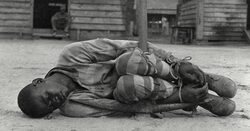
A QUICK READ
WHY SHOULD YOU CARE ABOUT CONVICT LEASING?
The discovery of the Sugar Land 95 through the construction of a Fort Bend ISD high school 2018 exposed a state-sanctioned system many people had never heard about: Convict Leasing.
In short, convict leasing was a new form of slavery. It involved the forced labor of mostly African-American men in conditions so horrendous the majority of its victims died within two years of entering the system.
Yet, as S.O.J.E.S. strives to memorialize and educate our community about convict leasing, its members often hear this statement:
They were prisoners, weren't they? They committed crimes. Why should I, or anyone, care about their situation?
Our response is simple: The convict leasing system was wrong. It was outrageous and inhumane. It benefitted only a handful of people at the expense of thousands of human lives. It was riddled with abuse and atrocities... just like or worse than slavery. And we must educate others, learn from this system to heal as a community, and do all that we can so it never happens again.
S.O.J.E.S. believes, as a community, it is imperative that we all do the difficult work of confronting our history of racial injustice. Our painful, yet candid connection with history shapes our present and helps build a future embedded in justice.
To be sure, Texas was not the only Southern state to practice convict leasing. The system can be traced as far back as the 1840s in Georgia, according to Digital History. Below is how the Equal Justice Initiative explains the evolution of convict leading in Texas and the South:
"After the Civil War, convict leasing persisted because Southern states leased prisoners to private railways, mines, and large plantations. While states profited, prisoners earned no pay and faced inhumane, dangerous, and often deadly work conditions. Thousands of Black people were forced into what authors have termed “slavery by another name” until the 1930s.
The Thirteenth Amendment to the U.S. Constitution, ratified in 1865, prohibited slavery and involuntary servitude, but explicitly exempted those convicted of crime. In response, Southern state legislatures quickly passed “Black Codes” – new laws that explicitly applied only to Black people and subjected them to criminal prosecution for “offenses” such as loitering, breaking curfew, vagrancy, having weapons, and not carrying proof of employment. Crafted to ensnare Black people and return them to chains, these laws were effective; for the first time in U.S. history, many state penal systems held more Black prisoners than white – all of whom could be leased for profit.
Industrialization, economic shifts, and political pressure ended widespread convict leasing by World War II, but the Thirteenth Amendment’s dangerous loophole still permits the enslavement of prisoners who continue to work without pay in various public and private industries. As recently as 2010, a federal court held that 'prisoners have no enforceable right to be paid for their work under the Constitution.' "
___________________________________________________________________________________________________________________________________________________
The Society of Justice & Equality for the People of Sugar Land - S.O.J.E.S. - believes it is important to become a necessary catalyst in propelling our community to bravely confront the unknown truth about our past local history of racial oppression and exploitation from slavery to convict leasing to segregation, through a creatively and cohesively proposed organized collaborative effort to create an educational center and museum (with both indoor and outdoor learning exhibits). We call this The Sugar Land 95 Experience.
References and sources: Mintz, S., & McNeil, S. (2018). Digital History. Retrieved (May 29, 2020) from http://www.digitalhistory.uh.edu
Equal Justice Initiative: https://eji.org/news/history-racial-injustice-convict-leasing/
WHY SHOULD YOU CARE ABOUT CONVICT LEASING?
The discovery of the Sugar Land 95 through the construction of a Fort Bend ISD high school 2018 exposed a state-sanctioned system many people had never heard about: Convict Leasing.
In short, convict leasing was a new form of slavery. It involved the forced labor of mostly African-American men in conditions so horrendous the majority of its victims died within two years of entering the system.
Yet, as S.O.J.E.S. strives to memorialize and educate our community about convict leasing, its members often hear this statement:
They were prisoners, weren't they? They committed crimes. Why should I, or anyone, care about their situation?
Our response is simple: The convict leasing system was wrong. It was outrageous and inhumane. It benefitted only a handful of people at the expense of thousands of human lives. It was riddled with abuse and atrocities... just like or worse than slavery. And we must educate others, learn from this system to heal as a community, and do all that we can so it never happens again.
S.O.J.E.S. believes, as a community, it is imperative that we all do the difficult work of confronting our history of racial injustice. Our painful, yet candid connection with history shapes our present and helps build a future embedded in justice.
To be sure, Texas was not the only Southern state to practice convict leasing. The system can be traced as far back as the 1840s in Georgia, according to Digital History. Below is how the Equal Justice Initiative explains the evolution of convict leading in Texas and the South:
"After the Civil War, convict leasing persisted because Southern states leased prisoners to private railways, mines, and large plantations. While states profited, prisoners earned no pay and faced inhumane, dangerous, and often deadly work conditions. Thousands of Black people were forced into what authors have termed “slavery by another name” until the 1930s.
The Thirteenth Amendment to the U.S. Constitution, ratified in 1865, prohibited slavery and involuntary servitude, but explicitly exempted those convicted of crime. In response, Southern state legislatures quickly passed “Black Codes” – new laws that explicitly applied only to Black people and subjected them to criminal prosecution for “offenses” such as loitering, breaking curfew, vagrancy, having weapons, and not carrying proof of employment. Crafted to ensnare Black people and return them to chains, these laws were effective; for the first time in U.S. history, many state penal systems held more Black prisoners than white – all of whom could be leased for profit.
Industrialization, economic shifts, and political pressure ended widespread convict leasing by World War II, but the Thirteenth Amendment’s dangerous loophole still permits the enslavement of prisoners who continue to work without pay in various public and private industries. As recently as 2010, a federal court held that 'prisoners have no enforceable right to be paid for their work under the Constitution.' "
___________________________________________________________________________________________________________________________________________________
The Society of Justice & Equality for the People of Sugar Land - S.O.J.E.S. - believes it is important to become a necessary catalyst in propelling our community to bravely confront the unknown truth about our past local history of racial oppression and exploitation from slavery to convict leasing to segregation, through a creatively and cohesively proposed organized collaborative effort to create an educational center and museum (with both indoor and outdoor learning exhibits). We call this The Sugar Land 95 Experience.
References and sources: Mintz, S., & McNeil, S. (2018). Digital History. Retrieved (May 29, 2020) from http://www.digitalhistory.uh.edu
Equal Justice Initiative: https://eji.org/news/history-racial-injustice-convict-leasing/
The Society of Justice & Equality for the People of Sugar Land | 5826 New Territory Blvd. #711, Sugar Land, TX 77479 | [email protected]
Proudly powered by Weebly

